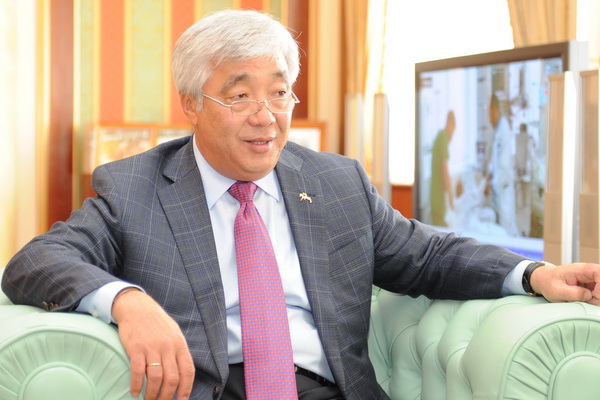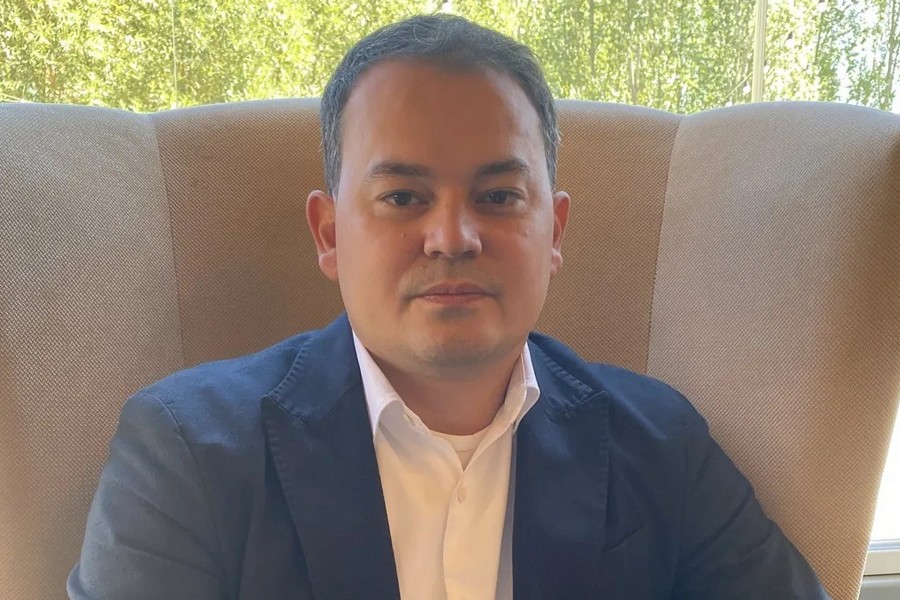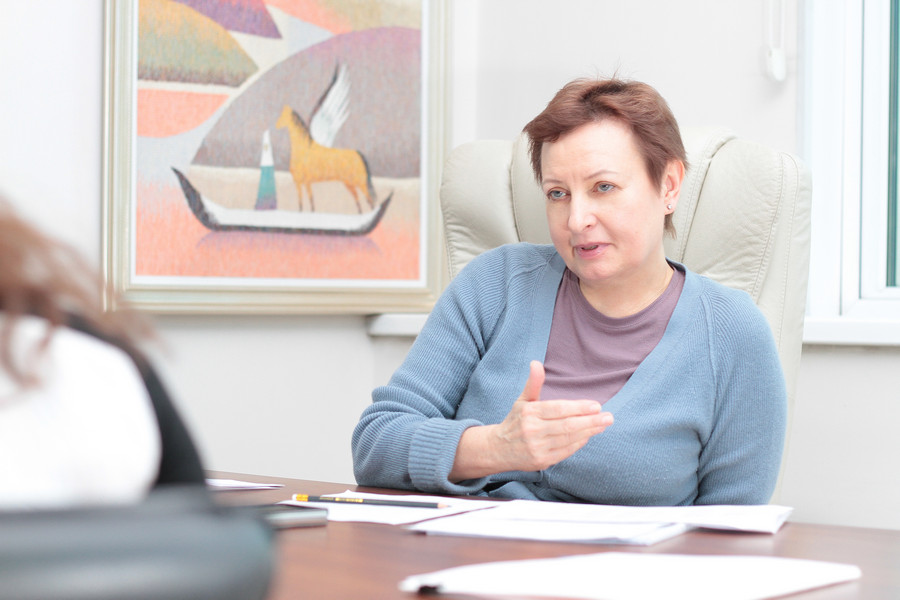Minister of Foreign Affairs of Kazakhstan Erlan IDRISSOV:
WITH SIGNED EEU TREATY WE GET TO PRINCIPALLY NEW LEVEL OF EQUAL ECONOMIC PARTNERSHIP. HERE THERE SHOULD BE NO ASSOCIATIONS WITH SOVIET PAST

Kazakhstan’s President Nursultan Nazarbayev signed the Law on Ratification of the Eurasian Economic Union (EEU) Treaty a few days ago. Kazakh Foreign Ministry Erlan IDRISSOV talked in an interview with Interfax-Kazakhstan what Kazakhstan’s residents should expect from the new organization, what interest in the EEU the other countries show, what economic benefits the convergence of the Troika countries would bring to.
- Mr. Minister, how important for Kazakhstan is a new stage of economic integration with Moscow and Minsk?
- The Eurasian economic integration significantly contributes to the economic development of our state. The Eurasian Economic Union [EEU] ushers in huge opportunities for the economy of our country. One should note that the Eurasian integration is exclusively about the economic interaction between the states. This is the vital principle of building on the integration. The meaningful difference between the Eurasian Economic Union and preceding forms of economic cooperation is the agreement, which essentially enhances opportunities for the development of our republic.
It is common knowledge that Kazakhstan is the world’s largest land-locked country and one of the most remote countries in terms of distance to the world ocean. High transportation costs stem access to the global markets and diversification of our economy.
That’s why the agreements on access to the infrastructure of the EEU partner countries would allow our exporters to reduce transportation and other costs. Accordingly, the competitive capability of products exported by Kazakhstan, including to the European countries, would rise.
The absence of customs borders between the countries participating in the Customs Union now already allows our global market exporters of grain and flour, some other end products and commodities to reduce transportation costs and traveling time.
At the same time, the EEU common market is a binding logical link between the East and the West. Under these circumstances Kazakhstan has a certain advantage in the form of shared borders with key markets such as China; we also border on the Central Asian growing market and reach the European markets through Russia and access to the sea.
The implementation of infrastructure projects such as Western Europe-Western China international transport corridor, construction of a railway en route Kazakhstan -Turkmenistan - Iran –the Persian Gulf really helps promote our transport attractiveness and create transcontinental “bridges”. With the aim of making the most of new railway routes we make big investments in our own infrastructure.
Recently the two main railways, Zhezkazgan-Beineu and Arkalyk-Shubarkol with the length of over 1,200 km linking Kazakhstan with China in the east and the Caspian Sea in the west of the country, were launched.
I am confident that in future the Eurasian integration will bring lots of benefit to the EU countries as well.
If before the European and Asian producers had to cross three state borders with relevant procedures, then now the creation of space with unified customs tariffs and standards will significantly simplify and accordingly increase intercontinental cargo haulage.
Our accession to the Asia-Europe Meeting organization (ASEM) will contribute to this, the goal of which is to arrange better contact in all spheres between the two parts of the Eurasian continent.
- How much has the world’s interest in Kazakhstan as in the EEU participant risen?
- The world’s interest has risen not only in Kazakhstan but in the EEU as a whole. Many countries wish to enter our common market because the EEU opens broad opportunities. The EEU is aimed at being one of the largest regional integration associations in the world with the population of over 170 million people and combined GDP of $2 trillion.
Currently Kazakhstan in conjunction with the Customs Union member states are holding negotiations with the European Free Trade Association (Switzerland, Norway, Island and Lichtenstein), with New Zeeland, Vietnam.
Joint research groups on studying the expediency of concluding free trade agreements with Israel and India have been set up because these states became interested in our market and are willing to start negotiations.
Currently a joint research group on studying the expediency of concluding a free trade agreement with Egypt is being established.
And at last, literally a few days ago, Armenia’s EEU accession treaty was signed and a roadmap on Kyrgyzstan’s accession to the Common Economic Space was approved as well.
- What can you say in reply to fears expressed by various analysts regarding the EEU future political unity?
- You have already answered some part of the question all by yourself referring to comments from various analysts. As the saying goes “how many people are so many opinions “.
One should clearly understand that the EEU is a strictly economic association.
Let me remind exactly 20 years ago in the Moscow State University the head of our state Nursultan Nazarbayev personally voiced the idea of the creation the Eurasian Union in the post-Soviet space.
At the initial stage the Customs Union was formed and then the Common Economic Space, and on May 29 this year in Astana the leaders of Belarus, Kazakhstan and Russia signed the EEU treaty.
To this end it is important to understand the following. Firstly, the EEU is not a political association. The treaty covers exclusively the issues of economic cooperation. Secondly, with the start of the EEU activity there will be no return to the Soviet Union. The principle of sovereignty equality, equal rights and consideration for national interests of the parties is secured.
The EEC treaty contains a clear-cut consensus mechanism for taking strategically meaningful decisions at all levels that rules out in parallel with other measures any possibility of dominance of any state. For example, the Board of the Commission, which is in fact a supranational body, contains a mechanism for taking decisions by consensus and by qualified majority. Decisions on the most sensitive issues will be taken by consensus, on the other matters by a two thirds qualified majority.
Moreover, any issue examined by the Board, may be blocked by the Commission Council, where decisions can be taken by consensus only. But even these decisions taken by the Commission may be revised by the Higher and Intergovernmental Councils. And as a last resort, appeal may be filed against any decision with the EEU Court which is being established.Thirdly, it is important to underline that under the Treaty nothing prohibits us from concluding agreements with third countries and international organizations. This is our principle of the multi-vector foreign policy. Notably President Nursultan Narzarbayev clearly formulated Kazakhstan’s position in this aspect” “As a sovereign state we actively cooperate with various countries, international organizations without hurting mutual interests. The Union must not prevent us from [activity] in this aspect”. Fourthly, Kazakhstan must be duly represented in the EEU bodies.
The EEU will have the two standing bodies – the Eurasian Economic Commission and the Court – where the equality of the parties will also be secured.
The Commission will be consisted of the two levels – the Council and the Panel. The Council will be represented by three deputy prime ministers from the member states. The Panel will include three representatives from each of the Troika states, the same rule applies to the EEU Court, to which two judges from each of the states will be assigned.
As far as the structural subdivisions of both the Eurasian Economic Commission and the EEU Court are concerned, at our suggestion, it is stipulated in the Treaty that the posts of directors and deputy directors will be held by representatives of the parties, taking the principle of their equal representation ratio into consideration. Other staff will be appointed on terms of competitiveness pro rata of the shared participation of the parties in financing these bodies.
I would like to emphasize once again that here there may be no associations whatsoever with our Soviet past. This is not a step backwards. We are reaching a new level of equal economic partnership whereas our independence remains unshakable.
Not accidentally on this matter Head of Our State Nursultan Narzarbayev said on April 25, 2013 that “if some associations cripple our country’s independence, our Constitution then we will immediately abandon this organization and get out of it”. And so I can state for sure that the EEU politicization is not happening and there is no threat to Kazakhstan’s sovereignty.
- What countries, besides Armenia and Kyrgyzstan, could become the EEU members in future?
- Now only these countries officially wished to join in the integration project, while Armenia, as we all know, has signed already the relevant treaty.
However I already said earlier that various countries show a big interest in concluding the so called preferential agreements with the EEU.
In addition, I would like to remind that at one of the Supreme Eurasian Economic Council summits President Nazarbayev said that we stand up for the EEU enlargement and the Union is not a closed organization.
- Many experts consider the EEU to be the European Union’s Eurasian counterpart. In your opinion, will the EEU not face difficulties now the EU is experiencing?
- During the EEU creation process our countries took as a basis the experience of building up the EU, reworked and adapted to us, of course.
The EEU is a platform of new opportunities for residents of our country and our neighbors. Imagine that within the framework of common space favorable conditions are created for the development of small and medium-sized businesses across our neighboring countries, which were historically bound with similar economic, trade, cultural ties.
This offers the hope that we will not face difficulties the EU is experiencing.
- Thank you for the interview!
November, 2014
© 2025 Interfax-Kazakhstan news agency
Copying and use of these materials without reference to the source is prohibited
Archive





